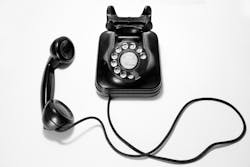Several years ago I remember reading a story somewhere that blew my mind and has now become a staple in our customer service training and onboarding programs. I don't remember where I read it, but it went something like this:
Not long ago, I took my car to a local repair shop to be serviced. It was in for an oil service. Before I left the shop that morning, I asked the service advisor to call me when the car was done, because I needed to arrange transportation. He enthusiastically agreed. This was at 7:30 a.m, and a co-worker was nice enough to pick me up at the repair shop and take me to the office. At 9:00 a.m., I received a call from the service advisor saying, "Your front brakes are worn out and require an additional $500 to replace.” I agreed, and asked if my car would still be ready that day. He said that he had already checked with his parts supplier and could get the brakes that day and install them. He again agreed to call me when the car was done.
At 10:00 a.m., I received yet another call. "We ran into a complication in replacing your brakes. Your brake caliper seized up." An additional $150 was added to my bill. I again asked if the car would be ready that day. I was still assured that the car would be completed by the end of the day . He asserted that he would call me once it was ready for pick-up.
At noon, I hitched a ride to lunch with a different co-worker. I assumed that my car must have still been on the lift, because the service advisor hadn’t called to let me know that it was available for pickup. We drove right by the repair shop twice. The service advisor had my cell phone number, so I again assumed that the car must not have been ready.
At 4:00 p.m., I noticed the time was getting late and I became concerned about my transportation situation. Was my car done? Did I need to hitch a ride home after work? Did I need a ride back to the shop to pick up the car? Was I going to have to get a ride to work in the morning? Why hadn’t they called to let me know? At this point I was doubtful that my car was going to be done before the end of the day because they had been so good at calling me earlier. For example, they had no problem calling me at 9:00 with the news regarding the brakes, and yet again at 10:00 with the news of the caliper complication. The service advisor assured me on three occasions that the car would be done and more importantly had given his word several times that he would call me when it was done. I was taught that giving your word was your bond.
Well, it was getting late and I needed to start getting my transportation situation locked down, so I reluctantly picked up the phone and called the repair shop. A different service advisor answered the phone. I was put on hold for a couple of minutes. When he came back to the phone, I was very surprised when he told me that the car had been done since 11:30 a.m. How do you think I felt? At no time during the day did I question the need for the repairs that were suggested, nor did I question the price. I simply asked to be notified when the vehicle was ready for pick up. I could have picked the car up on my lunch break.
How was I treated? I felt like an object that was exploited and maximized. It was obvious to me that they had more than enough time to call me when it was advantageous for their bottom line, but any concern for my personal transportation situation took a back seat to their need to sell work. One simple call. The service advisor broke his word. I am off to find another repair shop.
How often does this happen in your shop? How often is this happening at your competitor’s shop? It may be happening a lot more frequently than you may think.
You may also think it may be very harsh to lose a customer over something like this. As the service advisor, you may even feel that you did everything right. You had the customer’s car ready before the end of the day just as you said, the car was fixed right, you maybe even saved him some money with some discounts and the mechanic even caught that the car was potentially unsafe given the condition of the brakes, but in the customer’s eyes you let him down. He is now searching for a new shop.
After reading this story, I first thought to myself “this would never happen at my shop.” Our customer service had always been over the top and we had earned hundreds and hundreds of 5 star reviews online. I remember returning to my shop from my trip and just for amusement purposes I decided to launch an initiative to observe and prove this could never happen here. What I found blew my mind!
Even though we offered amazing customer service, I watched every day of that week our SA’s deeply buried in their daily duties—getting busy with other customers in-store, making sales calls, ordering parts, reviewing ROs with technicians and next thing you know it was 4 o’clock or sometimes even later before they had the “chance” to begin to making their “car is ready” calls. How many times was this “Story” being recreated every day right inside my own shop, and we did not even realize?
After this was revealed, my customer service team and I began a series of early morning meetings to bring awareness to what was happening and put together a plan to avoid this from ever happening to one of our customers again. As a result we implemented our “10/2” rule. Our 10/2 rule means that every customer in our shop gets at least 2 touches per day no matter what—one at 10AM and one at 2PM. A “touch” means either a phone call or text message. There are a lot of times where we don’t even have an update to give the customer, but just that extra touch to the customer has gone a long way. So many concerns are proactively avoided and customers now tell us that the level of our communication is amazing. We no longer hear those infamous “I dropped my car off at 8 a.m. this morning and have not heard anything,” concerns from customers any more.
In addition to raising the communication bar with our customers, we have also implemented a system to trigger the service advisor to immediately call the customer again once the car is washed and ready for pickup. The faster we can notify the customer, the better service we provide. The customer now has as many options as possible to make pickup arrangements and not scrambling towards the end of the day.
Excellent communication is the number one way to set your shop apart and keep good customers coming back again and again. Every service visit is a new opportunity. It doesn’t really matter what happened last time or the time before. We must be consistent with our communication or everything else that we go so far and beyond behind the scenes is at risk of not mattering. Unfortunately, we can be one forgotten return call away from losing a customer so I encourage you to take an honest assessment of your RO timeline process and make sure that what happened to that customer in the story, doesn't happen at your shop.
About the Author

